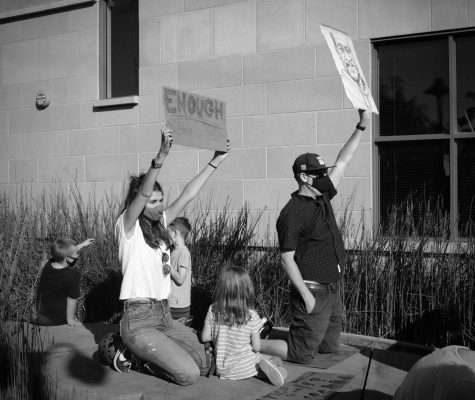8 Ways to Stay Politically Active During COVID-19
September 17, 2020
Even for the most politically motivated and interested, quarantine restrictions have made it more challenging to stay politically active. In anticipation of the upcoming 2020 election, activism, advocacy, and education about and for critical issues and candidates are vital, even during COVID-19. There are many ways to do so while staying safe.
1. Stay up to Date on Current Events
Staying up to date on current events is extremely important, especially during COVID-19 and the election season. A great way to do this is to follow newspapers on the News app and Twitter app, and turn notifications on. This way, top headlines will appear on the phone throughout the day. There are many reputable newspapers, including the New York Times, Washington Post, and Politico. In general, social media is a good source of news information, but fact-checking is key. Make sure there are multiple sources which back up large claims. Additionally, daily political podcasts such as Up First and The Daily are efficient and easy ways to hear the most significant news events each day.
2. Educate Yourself
Educating oneself is critical, especially in a time of widespread political polarization and discrimination. There are many basic books and shorter articles on important topics. However, while looking for information, remember to check the bias of the author or publisher. Reading material from multiple perspectives is a great way to form well-rounded, accepting, and inclusive opinions. During this time of large Black Lives Matter protests and the discussion surrounding systemic anti-Black racism, the books How to be an Antiracist by Ibram X. Kendi and White Fragility by Robin Diangelo are all essential reads.
 3. Donate
3. Donate
Another great way to stay involved in politics is to donate to important organizations and campaigns. Some great organizations are the ACLU, The Bail Project, People’s Breakfast Oakland, Anti Police-Terror Project, and The National Police Accountability Project. Local and national campaigns for the 2020 election season also take donations. Even small donations matter, as non-profit organizations are better able to raise money from foundations when they can show a broad base of grass-roots support.
4. Register or Pre-Register to Vote
Voting is a key element in making one’s voice heard, especially in the current day’s immense voter suppression. Register or pre-register to vote on registertovote.ca.gov.
5. Message your Local Representatives and Officials
Messaging local officials and representatives to express important issues and bills to support. Representatives are easily accessible on usa.gov/elected-officials. These messages can be online or through the mail. Make sure to be clear about one’s position, be brief, and humanize the message.
6. Sign Petitions
Petitions are a great way to make a change in one quick step. Many petitions are on change.org and aclu.org/action. Three important petitions are Defund the Police, Tell the Senate to Save USPS, and Support Just Marijuana Legislation. Petitions have made widespread change throughout history, such as the petition that led to the passing of the Preventing Animal Cruelty Act in 2017, and the petition which persuaded the Boy Scouts of America to end its ban on openly gay kids in 2013.
7. Join a City Board, Commission, or Student Advisory Board
There are many youth advisory boards and commissions for local organizations and cities. To find these, look on the city’s website, call the city hall, or contact city council members. This engagement is a great way to make change locally.
 8. Volunteer for your Candidate
8. Volunteer for your Candidate
As the 2020 election fast approaches, volunteering for candidates is critical. Candidates’ websites have volunteer resources and ways to sign up. This includes many virtual volunteer options, such as calling and texting.


